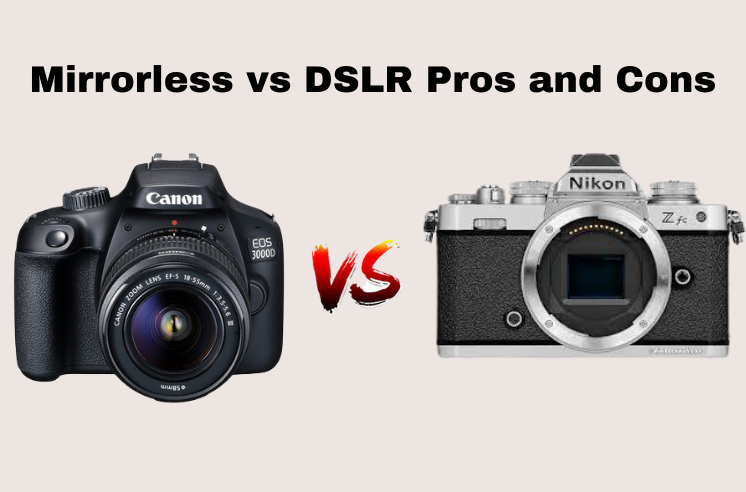Mirrorless vs DSLR – which camera is right for you? In this article, I’ll be breaking down the mirrorless vs DSLR pros and cons of each type of camera. So, if you’re considering buying a new camera and not sure what you should get, this guide is for you!
Pros and Cons of Mirrorless Cameras
Let’s take a closer look at the negatives and benefits of mirrorless cameras. This is just a brief overview of the most important points here, but we’ll move on to a more detailed comparison later in this section.
Pros of Mirrorless Cameras
- Small, light, and compact
- With fewer moving parts, they’re quieter than other cameras.
- No mirrors that flicker means there is no camera shake
- Reliable video mode
- The electronic viewfinder is utilized in video mode unlike the viewfinder on the DSLR can’t. Additionally, high-
- resolution is built into many mirrorlesses, even though they’re not the best in terms of quality.
- In-body stabilization
Cons of Mirrorless
- Battery life (though improving! Read more below for more information on this)
- Ergonomics (small perhaps too small for those with large hands)
- Limited lens selection (again, getting better! But a fair point)
- The electronic viewfinder is limited in dim lighting conditions
For a more comprehensive view of the advantages that mirrorless cameras offer, we’ll look at the best options. After watching the video, we’ll jump to the mirrorless comparison with the DSLR debate.
PROS OF DSLRS
Direct controls DSLRshave larger bodies, which is a necessity, which makes it easy to create special controls for certain functions, which makes easy and quick handling on the job.

Lenses: DSLRs have been in use for long enough that each manufacturer to develop an entire system. They come with a broad range of lenses, which includes specialty optics like tilt-shift lenses that you can choose from.
Viewfinder Some photographers are still using optical viewfinders since it provides a bright and clear image of the scene which appears more realistic than using an EVF.
CONS OF DSLRS
Weight and size: DSLRs are heavier than mirrorless models. This can be a significant difference during a hike or when packing bags with weight limits with an eye on them.
Reviewing pictures: You can only review images using back-facing LCDs, and they could be difficult to view in bright light. Mirrorless cameras allow you to view the image through the viewfinder too.
Third-party lenses Though DSLRs usually come with a wider selection of lenses native to them than mirrorless cameras however the options to utilize third-party lenses using adaptors are more limited.
Related: MIRRORLESS VS DSLR FOR BEGINNERS
Conclusion – Mirrorless Vs DSLR Pros And Cons
Hopefully, this guide has given a good overview of the pros and cons of DSLR cameras and mirrorless cameras. If you’re still not sure which to buy, I recommend answering more specific questions in the tables below, which should give you a better idea of what to look for. But keep in mind that your answers may change with future DSLR camera models, or even as new mirrorless camera models are released.
Moreover, if you don’t care too much about autofocus performance or noise, then the Fujifilm X-E2 or Sony A6000/A6300 may be better options as they offer additional capabilities like 4K video recording and additional resolution RAW formats. In the end, though, it really comes down to what you need; fortunately, there is such a wide variety of options available that there’s something out there for everyone.
Frequently Ask Question(FAQ)
Q. Which is better mirrorless or DSLR?
The DSLR has a wider range of interchangeable lenses. It also has a longer battery life and superior low-light photography due to its optical viewfinder. However, the mirrorless cameras weigh less and are portable, provide superior video quality, even with lower-end models, and also shoot higher quality images with faster shutter speeds.
Q. Do professionals use DSLR or mirrorless?
Do professional photographers utilize mirrorless cameras? Yes, they do. However, they utilize DSLR cameras, according to the style of photography. Actually, a lot of photographers change between DLSR as opposed to mirrorless cameras. Some people believe that autofocus and mirrorless lenses aren’t yet available but prefer DSLRs.
Q. Should I switch from DSLR to mirrorless?
One of the main advantages of using a mirrorless camera is that you’ll often obtain quality equivalent or even better than DSLR at a cheaper cost typically by hundreds of dollars. Tracking. While autofocus on DSLR can be very effective but the ability to track mirrorless cameras is more effective in recording motion.
Q. Is Nikon mirrorless worth buying?
Nikon Mirrorless cameras aren’t only among the top Nikon cameras available in the present, but they’re also among the most reliable mirrorless cameras available from any brand. Nikon is perhaps most well-known for its DSLR cameras. And they are still in high demand. Both sizes share identical Nikon Z lens mounts.
